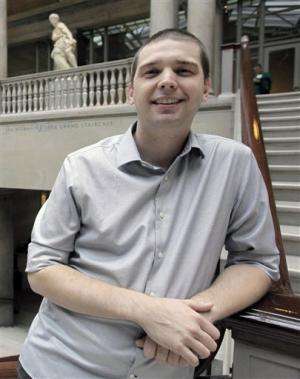In this Oct. 14, 2009 file photo, Andrew Mason, the CEO of Groupon, poses for a photo in Chicago. The struggling online deals company said Thursday, Feb. 28, 2013, after the market closed that it ousted Mason as CEO and will look for a new chief. (AP Photo/M. Spencer Greenm, File)
Struggling online deals pioneer Groupon has ousted its quirky founder and CEO Andrew Mason amid worries that people are tiring of the myriad of online restaurant, spa and Botox deals that Groupon built its business on.
Shares jumped following Thursday's announcement, which had been anticipated for months. Executive Chairman Eric Lefkofsky and Vice Chairman Ted Leonsis were appointed to the Office of the Chief Executive while a replacement is found.
"After four and a half intense and wonderful years as CEO of Groupon, I've decided that I'd like to spend more time with my family. Just kidding—I was fired today. If you're wondering why. you haven't been paying attention," Mason, 32, wrote in a memo to staff.
He referred to controversial metrics used in its regulatory filings ahead of Groupon Inc.'s November 2011 initial public offering of stock as well as "two quarters of missing our own expectations and a stock price that's hovering around one quarter of our listing price."
"The events of the last year and a half speak for themselves," he wrote. "As CEO, I am accountable."
The announcement came one day after Groupon reported a bigger-than-expected loss and gave a weak revenue outlook for the current quarter. The guidance had fueled investor worry—which started even before Groupon's IPO—that people are suffering from fatigue over the frequent emails flooding subscribers' inboxes. There were also worries that the company's efforts to broaden into an e-commerce powerhouse haven't been paying off.
Groupon said Mason was not available for interviews.
In a statement, Leonsis said, "Groupon will continue to invest in growth, and we are confident that with our deep management team and market-leading position, the company is well positioned for the future."
Groupon Inc. makes money by taking a cut from the online deals it offers on a variety of goods and services. Investors have questioned whether that business model is sustainable and leads to growth over the long term—and whether the company can not only grow its customer base but make more from each subscriber.
Groupon had the advantage of being first, but the model is easy to replicate. It has spawned many copycats after its 2008 launch, from startups such as LivingSocial to established companies such as Google Inc. and Amazon.com Inc. Chicago-based Groupon Inc. also has faced scrutiny about its high marketing expenses, enormous employee base and the way it accounted for revenue.
Mason, a Northwestern University graduate and former punk band keyboardist, founded Groupon in 2008. By 2010, Groupon was available in 25 countries and its staff ballooned to nearly 10,000, many times that of other Internet darlings such as Twitter, Facebook or Zynga Inc., the other fallen star of the latest swath of Internet IPOs.
Groupon's stock has lost about 77 percent of its value since the IPO after losing $1.45, or 24 percent, to close Thursday at $4.53. After the announcement of Mason's ouster, the stock gained nearly 4 percent in after-hours trading.
Copyright 2013 The Associated Press. All rights reserved. This material may not be published, broadcast, rewritten or redistributed.




















